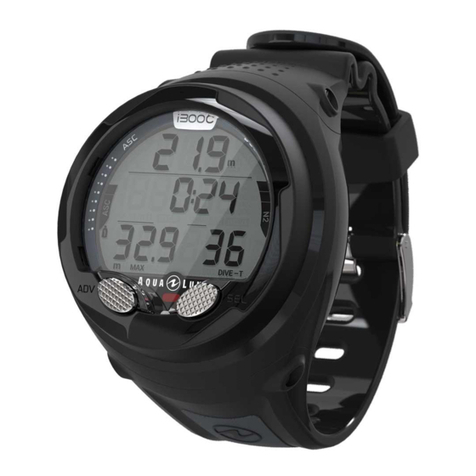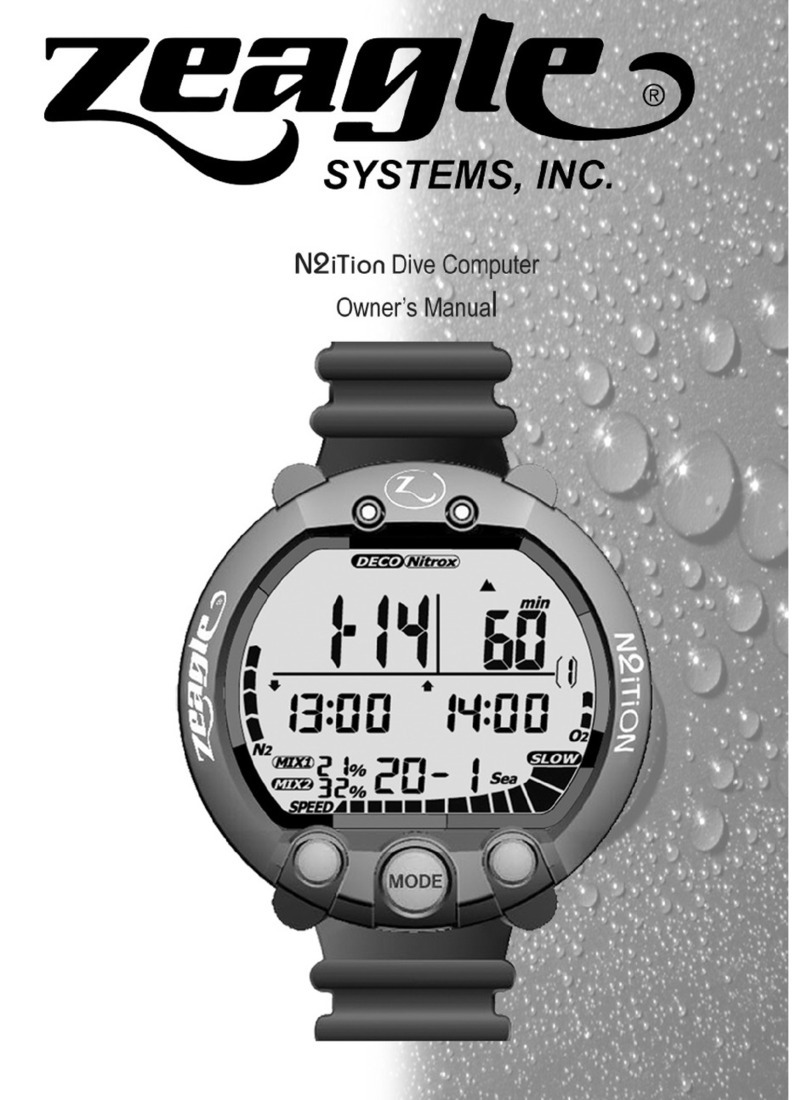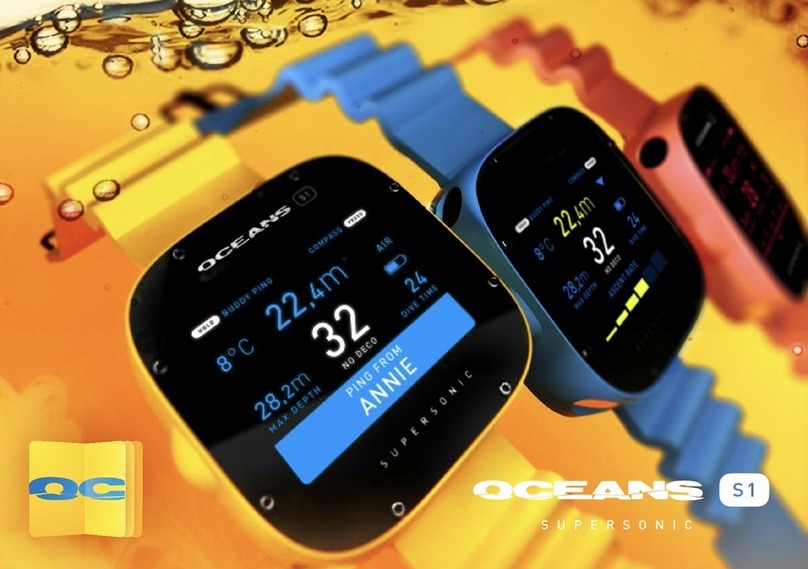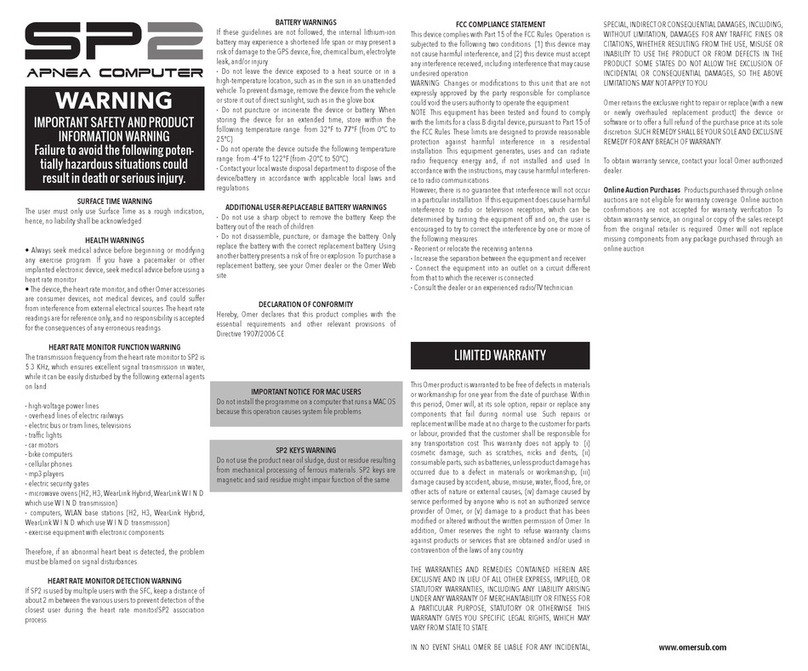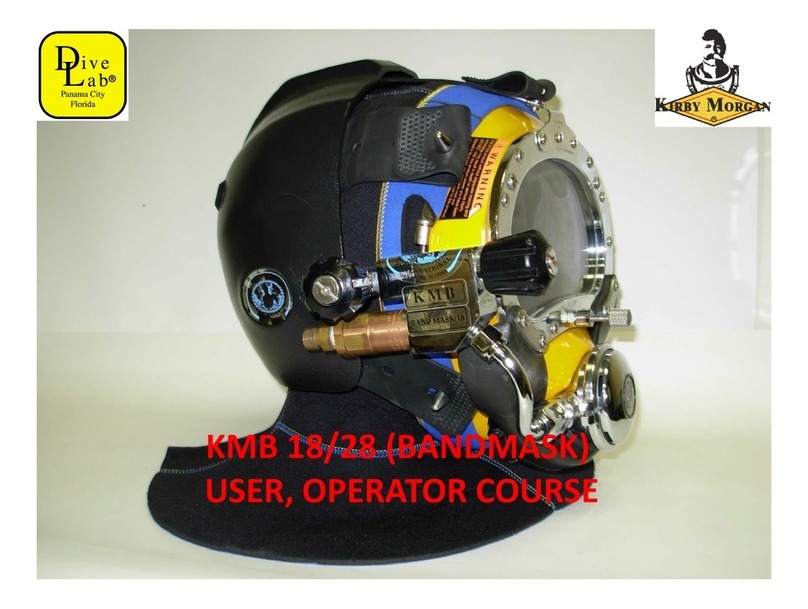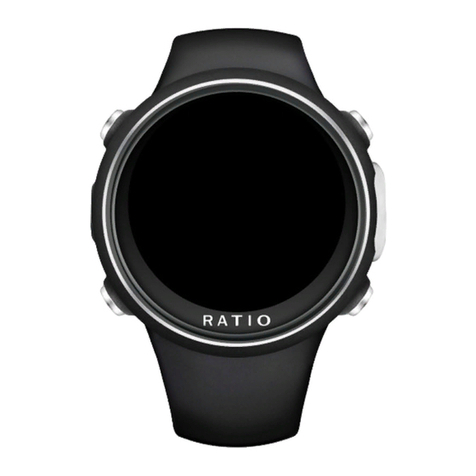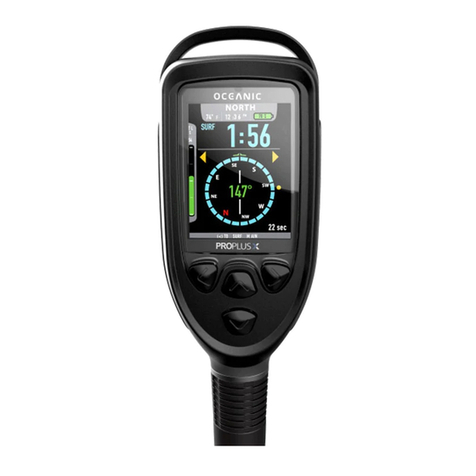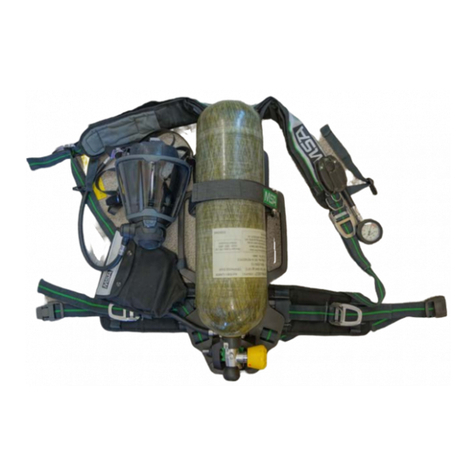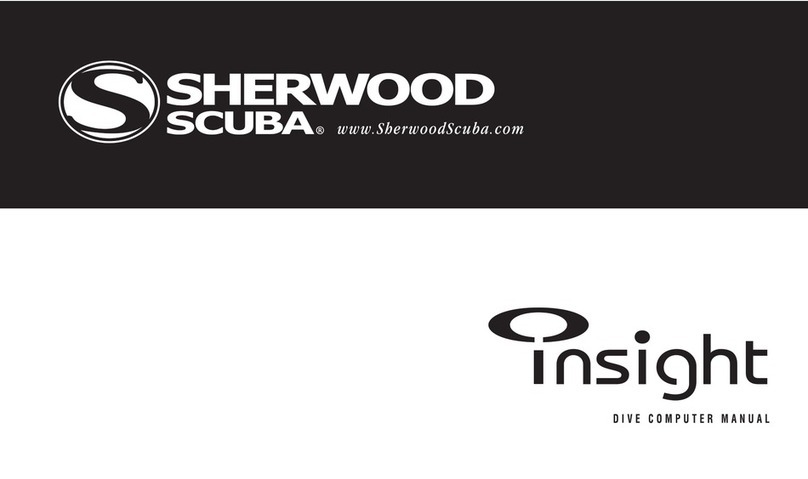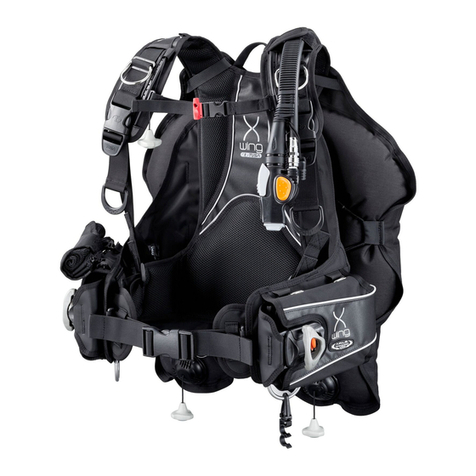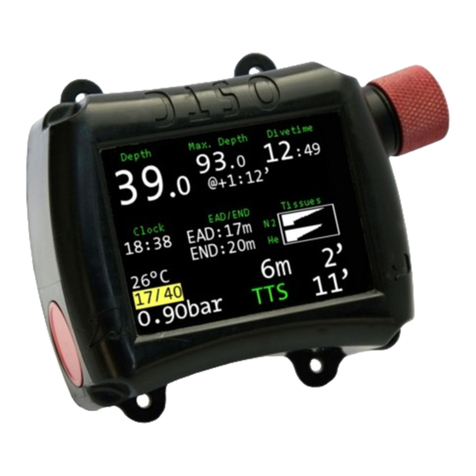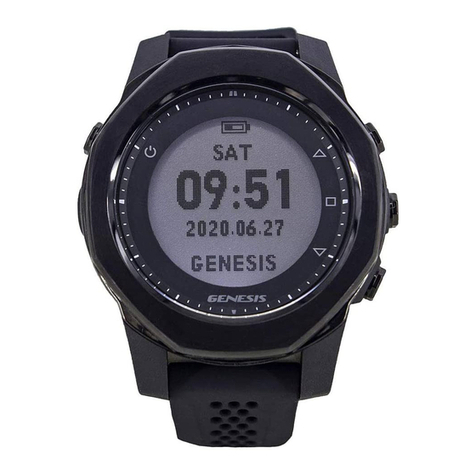Apeks WTX User manual

© 2014 Apeks
Copyright Notice
Warnings, Cautions and Notes
Safety Information
Apeks WTX Harness
Apeks WTX Buoyancy Cells
Attaching the MP Hose to the First Stage
Mounting a WTX Buoyancy Cell
Using Universal Cylinder Bands
Mounting a WTX Buoyancy Cell
Using GripLock™ Cylinder Bands
TABLE OF CONTENTS
Mounting a Single or Twin Cylinder(s)
Using Nuts and Bolts
Ination Methods
Deation Methods
Donning and Adjustment
Pre-Dive Inspection
Post-Dive Care and Maintenance
Storage
Dealer Inspection and Service
Warranty Information
WTX Buoyancy System

© 2014 Apeks
Table of Contents
COPYRIGHT NOTICE
This manual is copyrighted, all rights reserved. It may not, in whole or in part, be copied, photocopied,
reproduced, translated or reduced to any electronic medium or machine-readable form without prior
consent in writing from Apeks. It may not be distributed through the internet or computer bulletin board
systems without prior consent in writing from Apeks.
©2014 Apeks BC Owner’s Manual
Apeks is a registered trademark of Aqua Lung International
WARNINGS, CAUTIONS AND NOTES
Pay special attention to information provided in warnings, cautions and notes that are accompanied by
one of these symbols:
WARNINGS: Indicate a procedure or situation that may result in serious injury or death if
instructions are not followed correctly.
CAUTIONS: Indicate any situation or technique that will result in potential damage to the
product, or render the product unsafe if instructions are not followed correctly.
NOTES: Are used to emphasize important points, tips and reminders.

SAFETY INFORMATION
This manual provides essential instruction for the proper tting, adjustment, inspection and care of your
new BC. Because Apeks is utilizing patented technology, it is very important to take the time to read
these instructions in order to understand and fully enjoy the features that are unique to your specic
model. Improper use of this BC could result in serious injury or death.
Before using this buoyancy compensator (BC), you must receive instruction and certication in SCUBA
diving and buoyancy control from a recognized training agency. Use of SCUBA equipment by uncertied
or untrained persons is dangerous and can result in injury or death.
Read this owner’s manual completely before attempting to use your BC, and become familiar with it
rst in a controlled environment such as a swimming pool, in order to weight yourself properly and to
become comfortable with using its many features and adjustments.
Before every dive, perform a complete pre-dive inspection according to the procedure prescribed in this
manual, to ensure that all components are functioning properly and no signs of damage or leaks are
present. If you nd that your BC is not functioning properly or is damaged, remove it from service until
it can be repaired by an Authorized Apeks Dealer or Distributor.
Your BC is not a lift bag. DO NOT use it to bring heavy objects to the surface. Doing so may cause
permanent damage to the BC, and could also result in serious injury or death due to embolism or
decompression sickness.
In an emergency such as an out of air situation or uncontrolled descent, it is important to remove and
jettison weight immediately. DO NOT depend solely on using your BC’s power inator to lift you to the
surface.
In the event of an uncontrolled, rapid ascent, it is important to immediately begin venting air from the
BC. Continue venting air to slow your ascent rate if neutral buoyancy cannot be reestablished.
DO NOT inhale from your oral inator. The BC may contain harmful contaminants or gases, which could
cause suffocation or injury.
Factory prescribed service for this BC must be performed at least once annually by a factory trained
technician who is employed by an Authorized Apeks Dealer or Distributor. Annual service consists of
a complete overhaul of the power inator, and a general air leak inspection of the bladder and valve
connections.
Disassembly, repair, or lubrication must not be attempted by persons who are not factory trained and
authorized by Apeks. Unauthorized service will render the warranty null and void.
© 2014 Apeks
Table of Contents

This BC is designed for use with compressed air or Nitrox/EAN (enriched air nitrox) mixtures not
exceeding 40% oxygen. Any use of gas mixtures with increased oxygen content or the addition
of helium or other substances may cause corrosion, deterioration and/or premature aging of the
BC leading to component failure of the metal and rubber parts. The component failures could
lead to a loss of buoyancy control and/or pressure integrity of the BC resulting in injury or death.
Non-standard breathing mixtures may also present a risk of fire or explosion. The use of Nitrox/
EAN requires additional training. Failure to observe this warning may result in injury or death.
Use only nitrogen/oxygen mixtures containing no more than 40% oxygen.
This BC conforms to EN 1809: 1998. It has been tested by the National Institute of Professional Diving,
Notied Body No. 0078, Entrance No. 3, Port de la Pointe Rouge, 13008 Marseille, France.
TEMPERATURE LIMITATIONS: This BC should be used in temperatures no lower than -4°F (-20°C)
and no higher than 150°F (65°C).
WARNING: This is NOT a life jacket: It does not guarantee a head up position of the
wearer at the surface. It is not designed to provide face-up otation in all situations;
therefore it does not meet U.S. Coast Guard regulations for a life preserver or personal
otation device (PFD). If you become unconscious in the water without a buddy present
to immediately give assistance, you may suffer serious injury or death from drowning.
© 2014 Apeks
Table of Contents

Your buoyancy compensator is primarily designed to help you maintain neutral buoyancy while in a
comfortably balanced, face-down swimming position underwater. It is also designed to provide you
with otation so that you can rest on the surface, but it is not designed to function as a life preserver
or personal otation device (PFD). In order to meet U.S. Coast Guard regulations, a PFD must be
designed so that it automatically rights you to a face-up position and holds your head out of the water
on the surface. The design characteristics of a personal otation device are different from those of a
buoyancy compensator. The ability of any otation device to oat you in a face-up position can also
be affected by other diving equipment you wear, including a cylinder, weight or exposure suit, and
whether it can be inated before you lose consciousness.
For this reason, it is important to always dive with and maintain close proximity to your buddy at all
times. Do not depend on any otation device to hold your face above the surface in the event that you
are rendered unconscious in the water while diving.
If you have any questions regarding your Buoyancy Compensator or these instructions, please
contact your regional Apeks Dealer or Distributor. Distributor information is available on the
Apeks website at: www.apeks.co.uk
WARNING: Although this manual provides some basic guidelines for certain buoyancy control
techniques, it is not a substitute for training from a professional diving instructor. Failure to weight
yourself properly may create a hazardous condition that could lead to serious injury or death. If
you are unsure how to weight yourself in order to achieve optimum buoyancy underwater and
on the surface, do not dive until you have obtained the necessary instruction from your diving
instructor or an Authorized Apeks Dealer or Distributor.
© 2014 Apeks
Table of Contents

APEKS WTX HARNESS
Apeks’ harnesses, buoyancy cells and accessories are fully modular. They can be mixed and
matched to create the ideal system for you and the type of diving you choose to do. In addition, it
is easy to customize your system by adding or changing out various pieces of hardware. Whether
you want a travel friendly rig to dive in the tropics or a solid technical rig to dive deep, Apeks has
the right buoyancy conguration for you.
Removable Back Pad
VERSATILITY THROUGH MODULARITY
The back pad in the WTX harness is considered optional
and can be removed. It is held in place by simple hook
and loop.
Back Plate Allowances
If desired, the WTX harness gives the option of inserting
an Apeks back plate for additional weight or support. If you
are using nuts and bolts to attach a cylinder or cylinders to
the WTX harness, then a back plate must be used.
Dual Cylinder band Capability
A quick and easy way to attach a cylinder to the WTX
harness is the use of dual universal cylinder bands. The
bands can be run directly through the back of the harness
with or without a back plate installed.
Open Shoulder Design
The 2-inch webbing on the shoulders of the WTX harness
is an open design. While the WTX harness comes with a
2-inch angled D-ring on each shoulder, the shoulder can
be opened up to change out or add additional hardware.
NOTE: Optional GripLock™ cylinder bands
(PN 428240) may be purchased separately
for the WTX Harness.
© 2014 Apeks
Table of Contents

Crotch Strap
The crotch strap prevents the unit from riding up on the
diver’s torso while in the water. It also has a front mounted
underwater propulsion vehicle “scooter” ring and a 2-inch
accessory D–ring in back.
Chest Strap
The chest strap fits across your sternum and keeps
the two shoulders from slipping to the sides, ensuring
a comfortable and secure fit. The chest strap has the
option of being removed for those divers who find it
unnecessary.
Waistband Grommets
Located alongside each of the waistbands is a set of
accessory mounting grommets. The most common use
for these is to mount the optional SureLock™ weight
pouches. Apeks SureLock™ weight pouches may be
ordered separately from your Authorized Apeks Dealer
(p/n 388020). Instructions for mounting the weight
pockets are included in the weight pocket kit.
Retaining Loops
Below each of the shoulder release buckles, there is an
elastic retainer loop. These loops can be used to retain
excess shoulder webbing or they can be used to retain
an accessory such as a small ashlight. There is also a
retainer loop located on the crotch strap to retain excess
webbing.
© 2014 Apeks
Table of Contents

Attachment Points
light canister
deco gas
SureLock weight
pockets
inator hold-downs
deco gas
scooter attachment,
reel(s)
drysuit ination
system
surface markers,
lift bags, reel(s)
Your WTX harness has many attachment points for your various accessories. These recognized
attachment points are show below along with some of their more common uses.
Epaulets (Hold-downs)
On top of each shoulder are epaulets that hold down the airway(s). Not only do these epaulets hold
down the airway(s), they are also SOLAS reector devices for high visibility. The epaulets are removable
and can be repositioned to a new location based upon your needs.
Heavy Duty Metal Waist Buckle
The waistband on the WTX Harness is secured in front with a heavy-duty metal waist buckle. The
metal buckle can be positioned on either side of the waistband allowing for either a left hand or a
right hand release.
© 2014 Apeks
Table of Contents

APEKS WTX BUOYANCY CELLS
Oval Grommets for Dual Cylinder Bands
Each single cylinder buoyancy cell incorporates four oval
slots. These allow the buoyancy cell to be mated directly
to the WTX harness or back plate with the use of two
universal or GripLock™ cylinder bands.
SINGLE CYLINDER BUOYANCY CELL
To complement your choice of harness, Apeks manufacturers a selection of single cylinder and twin
cylinder buoyancy cells in assorted sizes and congurations.
Multiple Metal Grommets for Nut and Bolt Attachment
Single cylinder buoyancy cells also have multiple sets
of central metal grommets that give you the option of
mounting with nuts and bolts. These may be used if your
single cylinder is equipped with a single cylinder adapter
that has two bolts 11 inches (28 cm) apart on center.
© 2014 Apeks
Table of Contents

Side Expansion Gussets for Additional Lift Capacity
Some models have side expansion gussets that allow the cell to expand and provide additional lift
capacity without increasing the overall size.
Web Restrictor to Keep Cylinder Close to Body
Single cylinder buoyancy cells that have a ow through design at the bottom, also have a unique web
restriction at the bottom of the cell that creates an impression for the cylinder to nest into. This prevents
a fully inated cell from pushing the cylinder away from your lower back. Mounted on this web restrictor
is a 2" accessory D-ring. This easily accessible D-ring is a great location to attach a surface marker
buoy, lift bag, or back-up scooter.
Lower Left Pull Dump
Each single cylinder buoyancy cell comes standard with a lower left pull dump. This easy-to-reach
dump is convenient when dumping while inverted.
Elliptical Corrugated Hose
The Apeks technical airway found on each cell includes a corrugated hose that has an elliptical cross
section. This allows for a lower prole, which reduces drag and lays cleanly over the shoulder.
Safety Cable in the Airway
A safety cable can be found in the corrugated hose of each Apeks technical airway. This safety cable
protects the corrugated hose from hyper-extension and tearing that can be caused by any undue
stresses such as snags.
Heavy Duty Inator Brass Buttons
Technical diving equipment must be robust and reliable. Apeks’ new technical inator exceeds the
challenge. The secret to its reliability is its simplicity. Fewer parts mean less to go wrong and ease of
service. Once you hold the precision marine brass buttons in your hand, you will quickly realize that this
is not a recreational inator, but rather a serious tool to meet the dive at hand.
© 2014 Apeks
Table of Contents

Multiple Grommets for Nut and Bolt Attachment
TWIN CYLINDER BUOYANCY CELL
Twin cylinder buoyancy cells have three grommets near the
top of the center panel and a corresponding oval grommet
near the bottom of the center panel. The three grommets
allow the diver a choice of three height adjustment settings
to achieve proper trim of the cell. Rather than have the
lower bolt line up perfectly with a lower hole as other brands
require, the oval grommet accommodates bolts that are
slightly out of position.
Narrow at Top for Full Access to Valves and Regulators
Apeks buoyancy cells are designed to be slim at the top to allow the diver’s head to tilt back, encourage
proper hose placement and to assure that the diver has easy access to the manifold valves.
Lower Left Pull Dump
Each twin cylinder buoyancy cell comes standard with a lower left pull dump. This easy-to-reach dump
is convenient when dumping while in a horizontal or inverted position.
Optional Lower Right Pull Dump
On the lower right is an additional threaded manifold. While it comes capped off from the factory, it gives
the diver the option of adding a second pull dump. A dump valve kit is (p/n 42754).
Outer Bag made of 1000D ArmorShield™ Cordura
The outer bag of the twin cylinder buoyancy cell is made from 1000 denier ArmorShield™ Cordura. This
fade-resistant material was chosen for its extreme durability.
© 2014 Apeks
Table of Contents

Elliptical Corrugated Hose
The Apeks technical airway found on each cell includes a corrugated hose that has an elliptical cross
section. This allows for a lower prole, which reduces drag and lays cleanly over the shoulder.
Safety Cable in the Airway
A safety cable can be found in the corrugated hose of each Apeks technical airway. This safety cable
protects the corrugated hose from hyper-extension and tearing that can be caused by any undue
stresses such as snags.
Heavy Duty Inator Brass Buttons
Technical diving equipment must be robust and reliable. Apeks’ new technical inator exceeds the
challenge. The secret to its reliability is its simplicity. Fewer parts mean less to go wrong and ease of
service. Once you hold the precision marine brass buttons in your hand, you will quickly realize that this
is not a recreational inator, but rather a serious tool to meet the dive at hand.
Rugged Inner Bag made of Mil-Spec Material
The inner bladder of the buoyancy cell is made from a strong, coated fabric. This material meets all
necessary military specications and can be found on lifesaving otation equipment worn by military
pilots.
Inner Bag Protected from Zipper with V-Diamond™ Rubber
The inner bladder of the buoyancy cell is protected from getting caught in the outer zipper by using a
barrier of V-Diamond™ rubber.
Loops for Optional Retractor Kit
The buoyancy cell has loops sewn into the outer bag for an optional retractor kit (p/n 388300) which will
streamline the buoyancy cell while diving.
© 2014 Apeks
Table of Contents

Multiple Grommets for Nut and Bolt Attachment
TWIN CYLINDER REDUNDANT BUOYANCY CELL
Twin cylinder buoyancy cells have three grommets
near the top of the center panel and a corresponding
oval grommet near the bottom of the center panel. The
three grommets allow the diver a choice of three height
adjustment settings to achieve proper trim of the cell.
Rather than have the lower bolt line up perfectly with a
lower hole as other brands require, the oval grommet
accommodates bolts that are slightly out of position.
Narrow at Top for Full Access to Valves and Regulators
Apeks buoyancy cells are designed to be slim at the top to allow the diver’s head to tilt back, encourage
proper hose placement and to assure that the diver has easy access to the manifold valves.
Lower Left Pull Dump
Each bladder comes standard with a single lower pull dump. The left front pull dump is for the front bladder
and the right rear pull dump is for the rear bladder. The easy-to-reach dump valves are convenient when
dumping while in a horizontal or inverted position.
Optional Lower Pull Dump
Each bladder cell has an additional threaded manifold. While it comes capped off from the factory, it
gives the diver the option of adding a second pull dump. A dump valve kit is (p/n 42754). The additional
manifold for the front bladder is on the right front side and the additional manifold for the rear bladder
is on the left rear side.
NOTE: In the following description, the term "front" refers to the bladder closest to the diver when
wearing. The term "rear" refers to the bladder furthest away from the diver when wearing.
© 2014 Apeks
Table of Contents

Outer Bag made of 1000D ArmorShield™ Cordura
The outer bag of the twin cylinder buoyancy cell is made from 1000 denier ArmorShield™ Cordura. This
fade-resistant material was chosen for its extreme durability.
Elliptical Corrugated Hose
The Apeks technical airway found on each cell includes a corrugated hose that has an elliptical cross
section. This allows for a lower prole, which reduces drag and lays cleanly over the shoulder.
Safety Cable in the Airway
A safety cable can be found in the corrugated hose of each Apeks technical airway. This safety cable
protects the corrugated hose from hyper-extension and tearing that can be caused by any undue
stresses such as snags.
Heavy Duty Inator Brass Buttons
Technical diving equipment must be robust and reliable. Apeks’ new technical inator exceeds the
challenge. The secret to its reliability is its simplicity. Fewer parts mean less to go wrong and ease of
service. Once you hold the precision marine brass buttons in your hand, you will quickly realize that this
is not a recreational inator, but rather a serious tool to meet the dive at hand.
Rugged Inner Bag made of Mil-Spec Material
The inner bladder of the buoyancy cell is made from a strong, coated fabric. This material meets all
necessary military specications and can be found on lifesaving otation equipment worn by military
pilots.
Inner Bag Protected from Zipper with V-Diamond™ Rubber
The inner bladder of the buoyancy cell is protected from getting caught in the outer zipper by using a
barrier of V-Diamond™ rubber.
Loops for Optional Retractor Kit
The buoyancy cell has loops sewn into the outer bag for an optional retractor kit (p/n 388300) which will
streamline the buoyancy cell while diving.
Dedicated Inator for each Bladder
The left side inator is for the front bladder and the right side inator is for the rear bladder.
© 2014 Apeks
Table of Contents

Apeks recommends that you bring your buoyancy compensator, together with your regulator, to your
authorized dealer for the installation of the MP inator hose and other accessories. The retailer can also
answer any questions you may have pertaining to the information in this manual.
If it is not possible to return the BC with your regulator to your authorized dealer, you may install the MP
quick disconnect inator hose by carefully performing the steps in the following procedure.
ATTACHING THE MP HOSE TO THE FIRST STAGE
1. Remove the inator hose from the power inator body
by gripping the grooved sleeve over the quick disconnect
coupling with your thumb and forenger. Slide the sleeve
back.
2. Remove the port plug from an MP port on the regulator
using an appropriately sized wrench.
WARNING: DO NOT connect the inator hose
to a high pressure (HP) port (greater than 200
psi / 14 bar). This may cause the hose to burst
when pressurized, which can result in serious
injury. If you are unsure which regulator port
is medium pressure (MP) or high pressure
(HP), consult your regulator owner’s manual
or your dealer before attaching the hose.
3. Check to ensure the o-ring is present and in good
condition. Screw the threaded end of the hose into the
port and tighten to 40 in-lbs (46 kg-cm) with a 9/16”
wrench.
© 2014 Apeks
Table of Contents

A single cylinder buoyancy cell may be attached directly to an Apeks back plate or the WTX harness
using dual universal cylinder bands.
NOTE: The terms “hook,” “loop,” and “hook & loop” are used throughout this manual. Hook &
Loop is commonly known as Velcro®, which is a trademarked brand of hook & loop. Many of the
BC’s components have hook & loop attachments, including the waistband, cylinder bands, and
weight pouch aps.
MOUNTING A WTX BUOYANCY CELL USING UNIVERSAL CYLINDER BANDS
Mounting Directly to the Back Plate
1. Set the back plate on a table with the Apeks logo side
down. Identify the series of four slots at the top and
bottom of the Apeks back plate that accommodates the
cylinder bands.
1 2 3 4
1 2 3 4
2. While viewing from the back, insert the upper cylinder
band through the upper left slot in the buoyancy cell
and on through slot 1 in the back plate. Make sure
that the hook and loop of the cylinder band is facing
outward.
© 2014 Apeks
Table of Contents

3. Weave the cylinder band through the three remaining
upper slots in the back plate.
4. After exiting slot 4, the last slot in the series, direct the
cylinder band out the remaining slot of the buoyancy
cell.
5. Slide a gripper pad onto the cylinder band with the
ribbed side facing toward the cylinder.
6. Repeat the process for the lower cylinder band.
© 2014 Apeks
Table of Contents

1. Firmly grasp the metal D-ring with your left hand.
THREADING THE CAM BUCKLE
Mounting Directly to the WTX Harness
1. Insert the cylinder bands through the left slots in the
buoyancy cell and on through corresponding web
loops in the WTX harness. Make sure that the hook
and loop of the cylinder bands are facing outward.
2. After exiting the second webbed loop, direct the cylinder
band out the remaining slot of the buoyancy cell.
3. Slide a gripper pad onto each cylinder band with the
ribbed side facing toward the cylinder
2. While rmly holding the metal D-ring, rotate the buckle
back towards the webbing. The buckle should form an angle
with the metal D-ring as shown in the top view.
TOP VIEW
© 2014 Apeks
Table of Contents

3. Insert band through the metal D-ring, then through the
middle slot of the buckle.
4. Weave band through the inside slot of the buckle.
© 2014 Apeks
Table of Contents

SECURING YOUR BUOYANCY SYSTEM TO THE CYLINDER USING UNIVERSAL CYLINDER BANDS
2. Slide the cylinder band over the cylinder so that the BC
is at the desired position in relation to the cylinder valve.
Make sure the cylinder valve air outlet is facing the back
of the BC.
3. While holding the cylinder secure, pull the free end of
the upper cylinder band webbing until there is a very
tight t between the pack and the cylinder.
NOTE: Universal cylinder bands adjust for all standard cylinder diameters.
WARNING: The cylinder band will initially stretch as it becomes wet. Always wet the band
before making the nal adjustment; apply enough tension to ensure that the cylinder is
completely secure. Test this connection before every dive. If the cylinder slips free from
the BC during the dive, you may loose your air supply, which could lead to serious injury
or death.
1. Slide the cylinder bands over the cylinder so that the BC
is at the desired position in relation to the cylinder valve.
Make sure the cylinder valve air outlet is facing the back
of the BC. Secure the upper cylinder band rst to check
for proper cylinder placement.
© 2014 Apeks
Table of Contents
Table of contents
Other Apeks Diving Instrument manuals
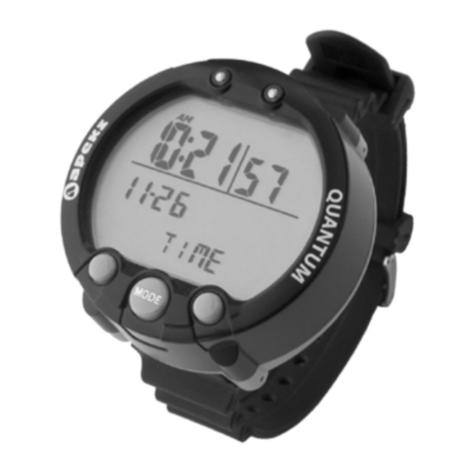
Apeks
Apeks Quantum User manual
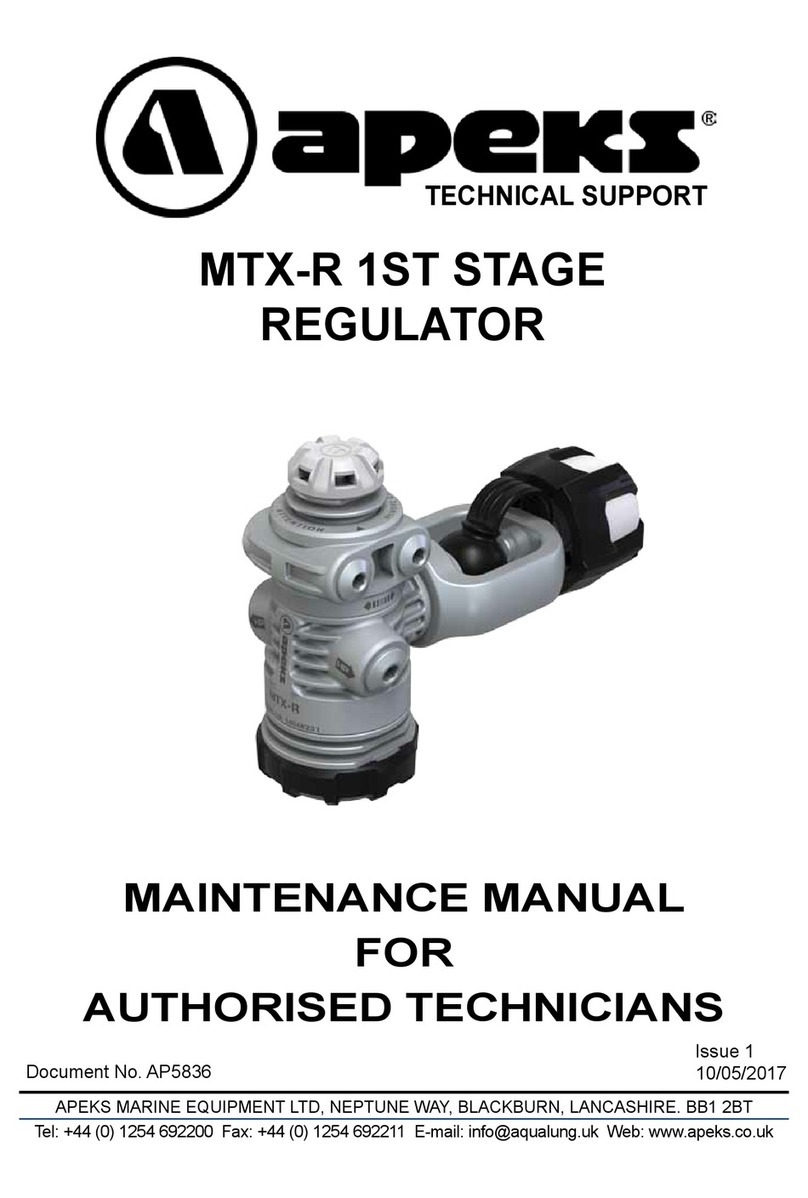
Apeks
Apeks MTX-R User manual
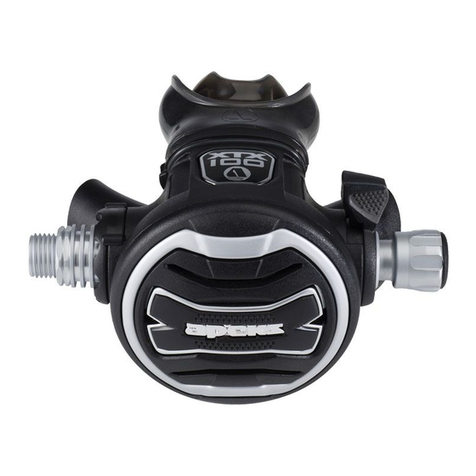
Apeks
Apeks XTX200 User manual
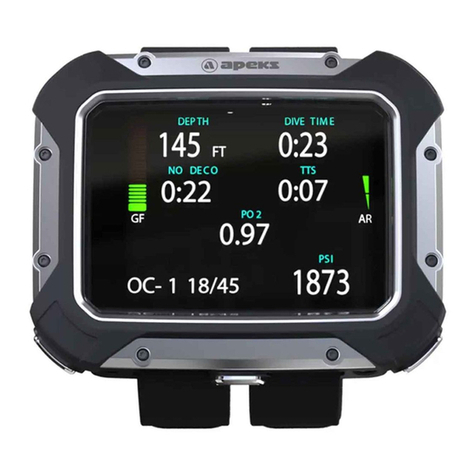
Apeks
Apeks NS158000 User manual
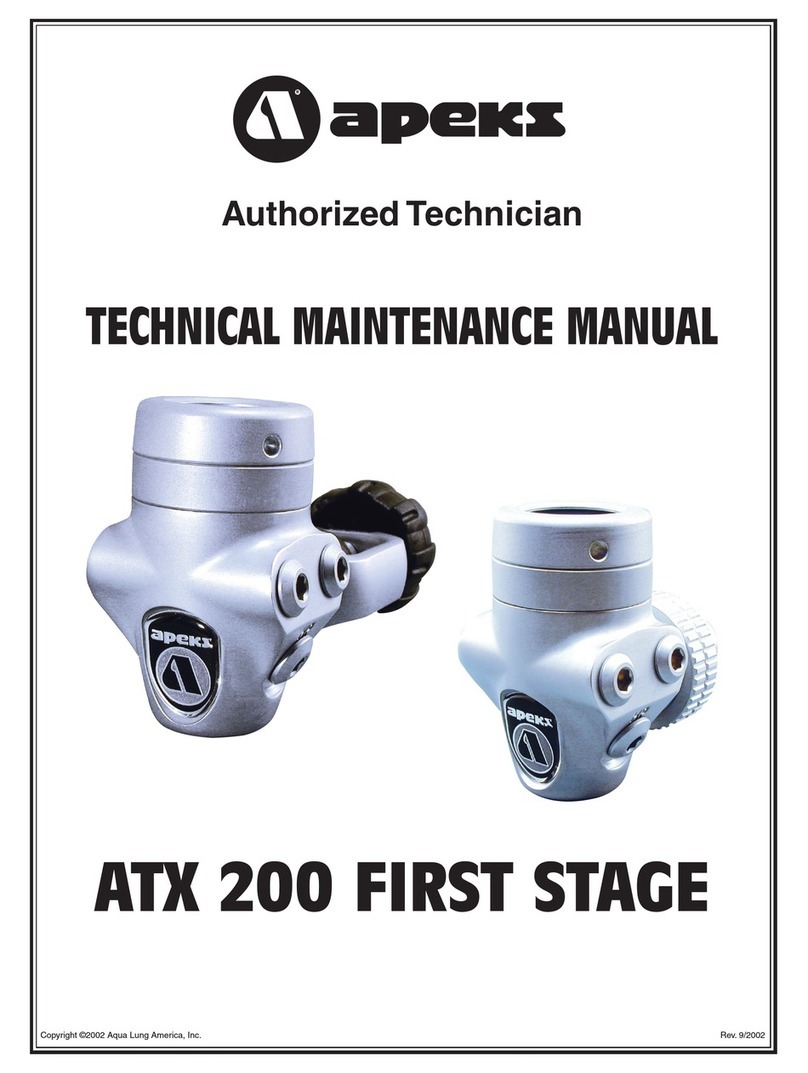
Apeks
Apeks ATX 200 User manual
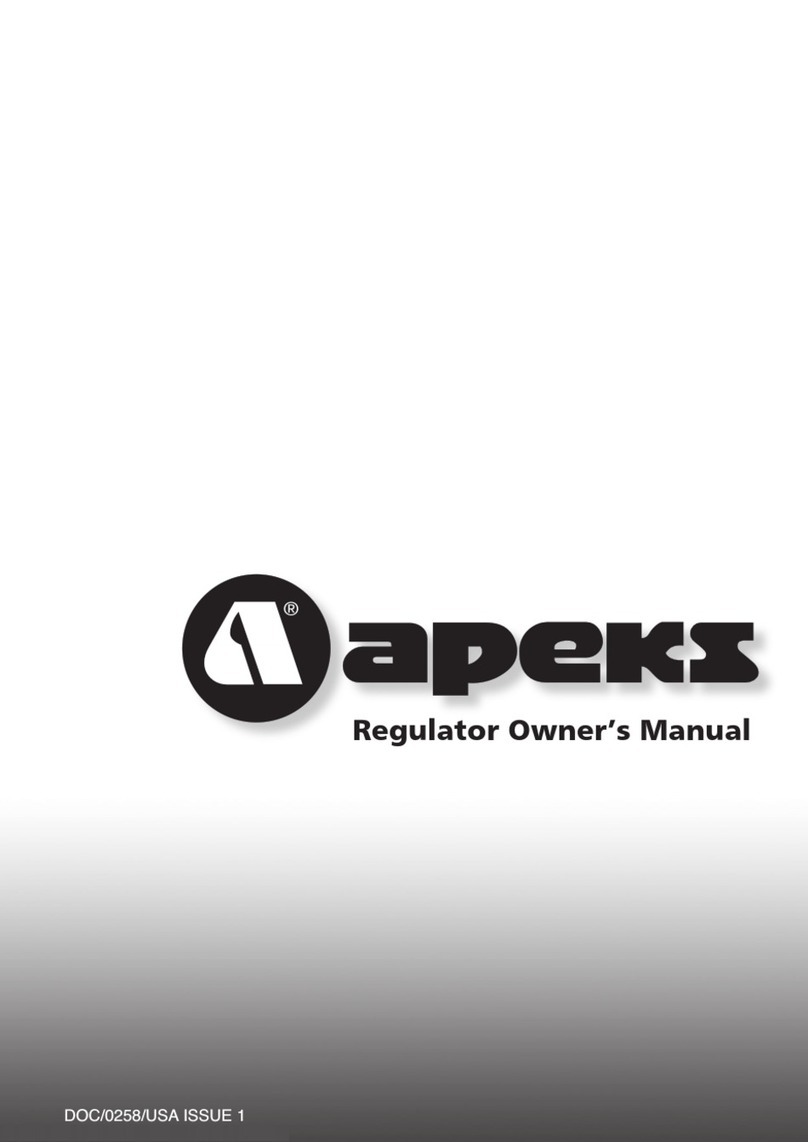
Apeks
Apeks Regulator User manual
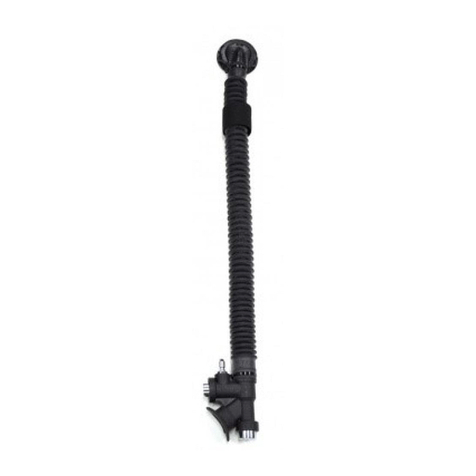
Apeks
Apeks WTX INFLATOR User manual
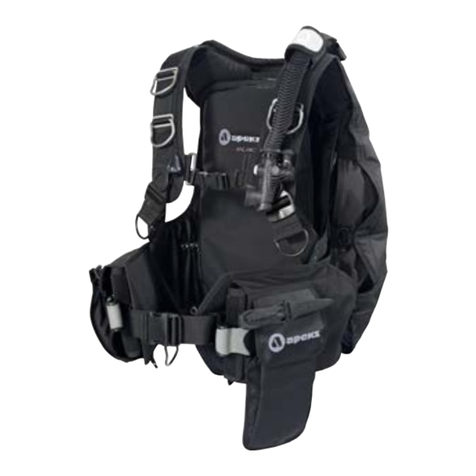
Apeks
Apeks Black Ice User manual
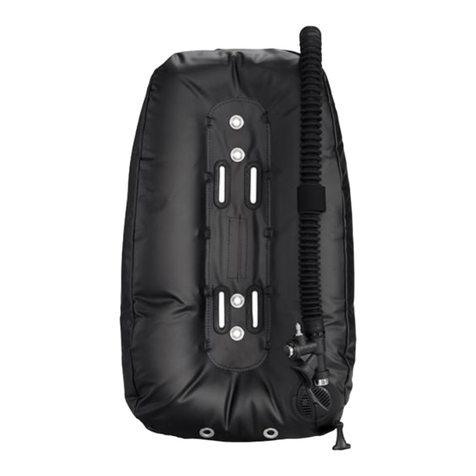
Apeks
Apeks wtx series User manual
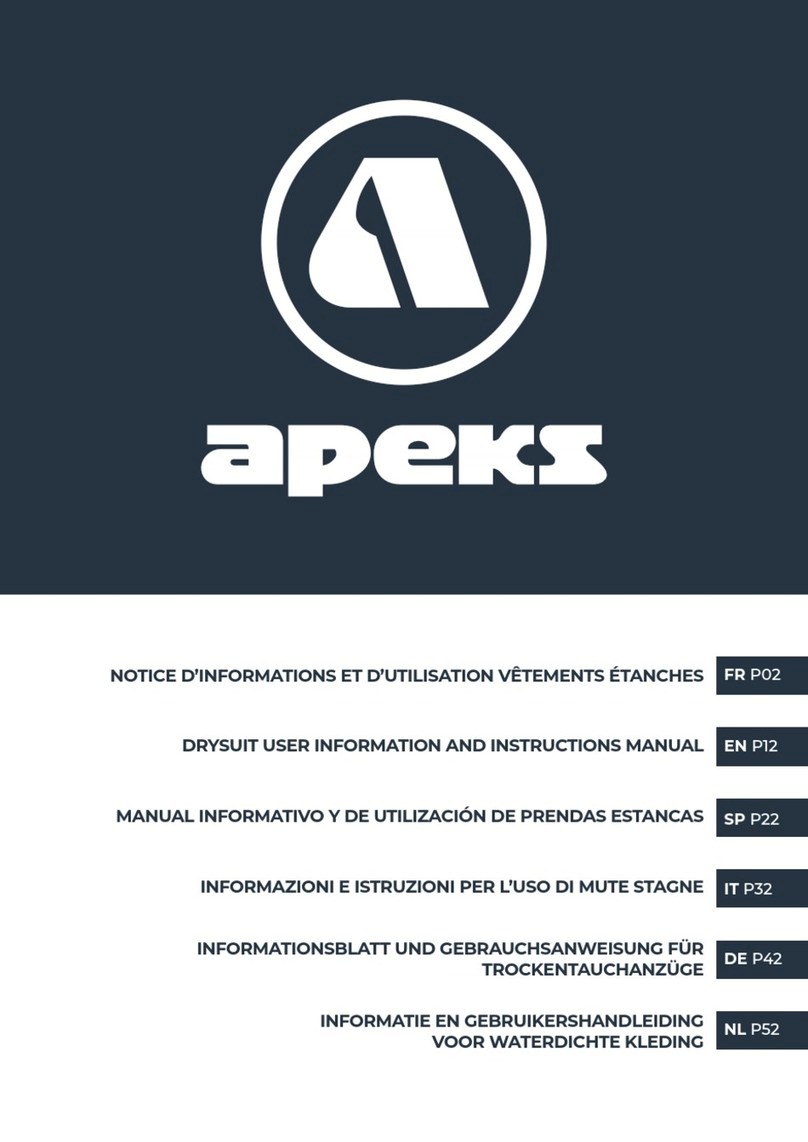
Apeks
Apeks ThermiQ Dry Advanced User manual
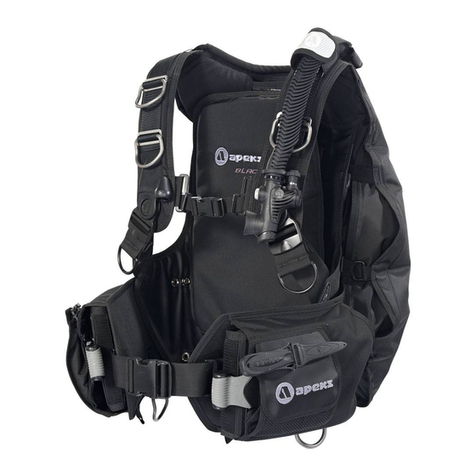
Apeks
Apeks Black Ice Twin Cylinder Kit User manual
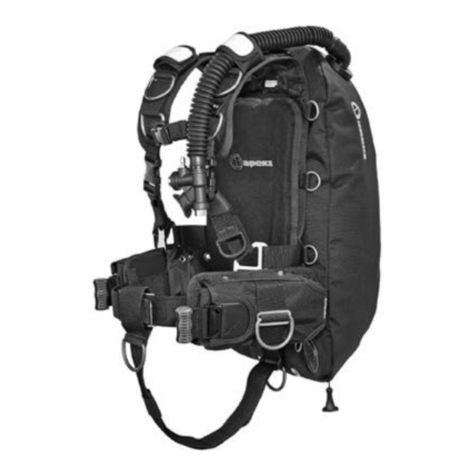
Apeks
Apeks WTX-D User manual

Apeks
Apeks 427106 User manual
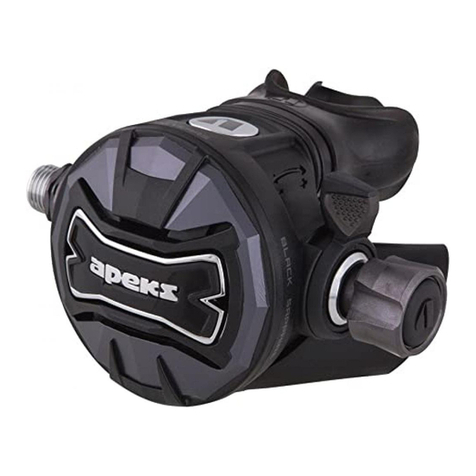
Apeks
Apeks BLACK SAPPHIRE User manual
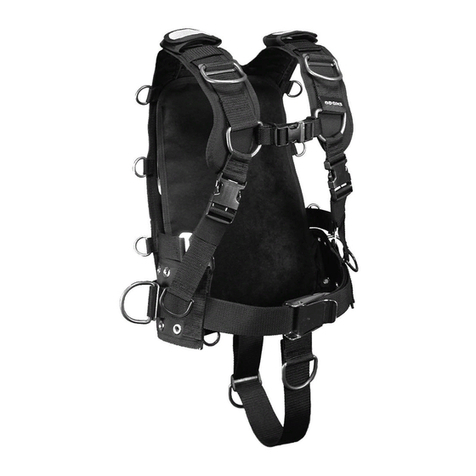
Apeks
Apeks wtx series User manual
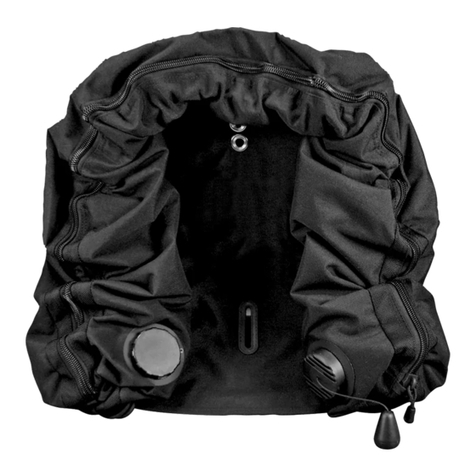
Apeks
Apeks 388300 User manual
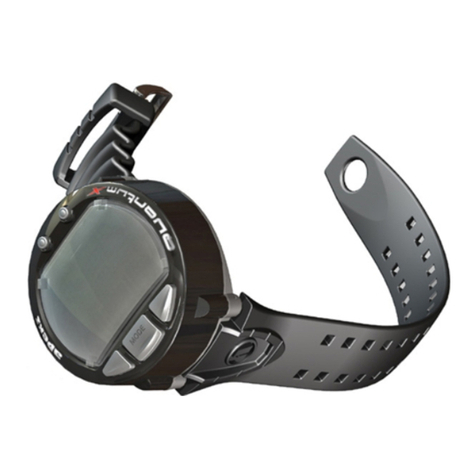
Apeks
Apeks QuantumX User manual

Apeks
Apeks wtx series User manual
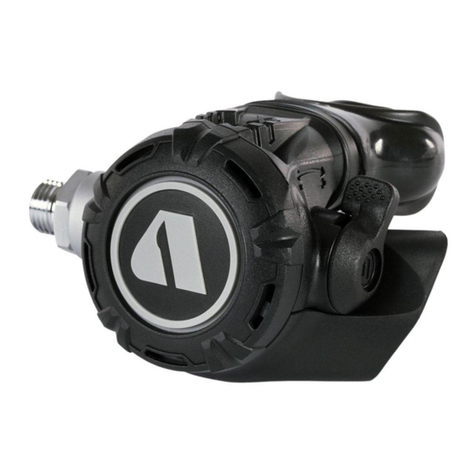
Apeks
Apeks XL4 SECOND STAGE User manual
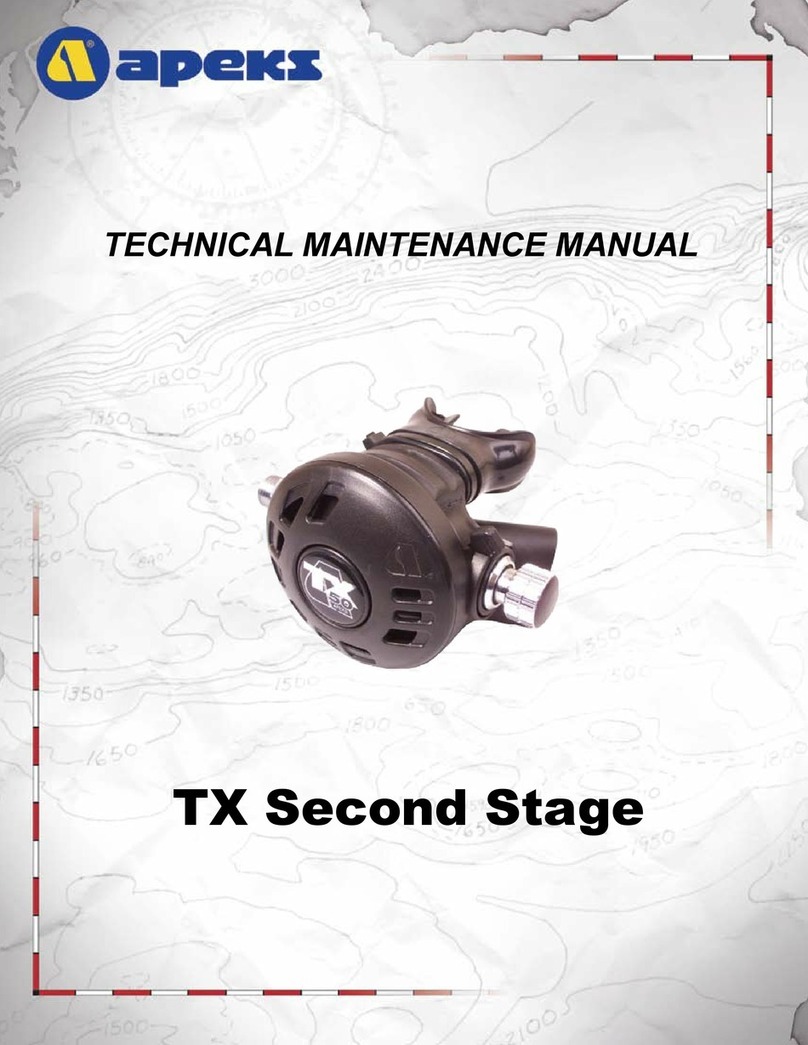
Apeks
Apeks TX Series User manual

